If your drinking water contains glyphosate, or if you are concerned about the possibility of exposure to this chemical, you may be wondering if Brita filters can remove it from your water.
While Brita filters are not specifically designed to remove glyphosate, they do have the ability to reduce the amount of this chemical in your water. Brita filters use activated carbon which is a very effective treatment method for removing glyphosate. However, Brita filters contain a limited amount of carbon and have a relatively short contact time.
As a result, Brita filters are not able to remove all of the glyphosate from drinking water. If you have high levels of glyphosate in your drinking water, you should consider a more effective treatment method such as reverse osmosis or granular activated carbon filters.
Continue reading to learn more about glyphosate and how you can remove it from your drinking water.
What is Glyphosate
Glyphosate is used in products such as Roundup to control weeds in both agricultural and non-agricultural settings. It is a broad-spectrum herbicide that is applied to the leaves of plants to kill both grasses and broadleaf plants. It is also used to control aquatic plants.
Products containing glyphosate are sold in various formulations, including as liquid concentrate, solid, and ready-to-use liquid. It can be used in agricultural, residential, and commercial settings using a wide range of application methods.
Glyphosate was first registered for use in the U.S. in 1974. It is one of the most widely used herbicides in the United States.
Products that contain glyphosate
There are more than 750 products containing glyphosate for sale in the US. It is the active ingredient in the following herbicides:
- Roundup – made by Monsanto
- Rodeo Aquatic Herbicide – made by DowDuPont
- Eraser – made by Martin’s
- GroundClear – made by Ortho
- RM43 Total Vegetation Control – made by Ragan & Massey
- Ranger Pro Herbicide – made by Monsanto

How does glyphosate get in my water
Glyphosate, the active ingredient in popular weed killer products like Roundup, can get into our water supplies through runoff from farms and fields where it’s being used as an herbicide. This powerful chemical seeps into the subsurface where it tends to bind with soil particles. While this inhibits its mobility, glyphosate still finds its way into our water supply through soil erosion or careless application of the chemical.
Glyphosate is very soluble in water. It has been found to persist for more than 300 days in dark, low light conditions. Because it remains in the environment for a long time, trace amounts of glyphosate are more likely to be ingested by people and animals.
The glyphosate becomes accessible for human consumption when municipalities or individual homes draw water from those sources for their drinking water supply.
Health concerns with Glyphosate
Glyphosate has been the subject of many studies and reviews. The United States Environmental Protection Agency (EPA) has determined that there are no risks of concern to human health from current uses of glyphosate.
The EPA noted that glyphosate is not an endocrine disruptor. They also found no indication children are more sensitive than adults when exposed at similar levels. Most importantly, EPA found no evidence that glyphosate causes cancer in humans.
In 2015, a panel of experts working for the World Health Organization’s International Agency for Research on Cancer reviewed available medical research on glyphosate. They determined that glyphosate is “probably carcinogenic”. The state of California has declared glyphosate to be a carcinogenic substance.
Drinking water standard for Glyphosate
In the United States, glyphosate levels are regulated by federal law under the Safe Drinking Water Act. The federal drinking water standards is 700 parts per billion (ppb).
In addition to this limit, some states have established stricter standards. Minnesota set their safe limit for glyphosate at 500 ppb. Wisconsin established a standard of 10 milligrams per liter
(mg/L) for glyphosate. This is equivalent to 10,000 ppb.
Brita Filters and glyphosate Removal
Brita filters use activated carbon to remove contaminants from drinking water. Activated carbon is a very effective treatment method for removing glyphosate from water.
Brita filters that used activated carbon, such as Longlast and Longlast+, can remove glyphosate from drinking water.
Brita Longlast+ filter and glyphosate treatment
Brita Longlast+ filters use activated carbon which is a best available control technology for glyphosate removal. Based on this, the Longlast+ filter from Brita is expected to remove glyphosate from your drinking water.
 Brita faucet filters and glyphosate treatment
Brita faucet filters and glyphosate treatment
Brita faucet filters have an activated carbon filter integrated into them. The activated carbon can effectively remove glyphosate from water.
The Brita faucet filter is expected to remove glyphosate from drinking water.
How well do Brita pitcher filters remove glyphosate
Brita pitcher filters with activated carbon are expected to remove glyphosate from drinking water. As noted above, activated carbon performs very well with Roundup in water.
CW Labs conducted a test of various water pitchers to see how well they could remove glyphosate. They tested Brita’s pitcher filter and found that it removed 50.4% of glyphosate.
What is the maximum concentration of glyphosate Brita filters can remove
Brita filters have a relatively small amount of activated carbon in them. Carbon, also known as charcoal, is a great treatment technique for removing glyphosate. However, given the small amount of activated carbon they contain, their ability to remove significant amounts of this contaminant is limited.
Given the health considerations associated with glyphosate, you may be better off using another treatment method to purify your water.
Brita claims about glyphosate
Brita does not make any claims about the ability of their filters to remove glyphosate from drinking water. Their website includes a list of contaminants their products are designed to treat. Roundup is not listed as one of the contaminants their filters can remove.
Learn more about Brita filters and the contaminants they can remove from drinking water.
Test Your Drinking Water for Glyphosate (Roundup)
Tap Score offers a home test kit for glyphosate in drinking water. The package includes all the materials needed to submit a sample for laboratory testing. You’ll receive a full report with detailed and quantified analysis of glyphosate levels in your water.
Order your kit today.
Brita Product Summary
Brita has an extensive line of filtration products to meet your water treatment needs. Their filters include:
- Pitcher filters
- Faucet filters
- Bottle filters
- Dispenser filters
- Replacement filters
Brita pitcher filters
Brita has 12 pitcher filter models available. They come in capacities ranging from 6 to 12 cups, a variety of features, and many color options.
Depending on which pitcher filter you have, you can choose between three different replaceable filters. I have a review and summary of them in the section below.
Features you may want to consider include:
- Autofill lid – Pitchers with autofill lid option don’t have a lid, so you don’t have to lift it up to fill the reservoir.
- Easy-fill lid – Similar to autofill lids, pitchers with this option don’t have a lid to lift up.
- Electronic filter indicator – The filter indicator lets you know when it’s time to replace a spent filter. It is activated when the lid opens for 5-8 seconds (based on size of reservoir) and measures how much water has been treated by keeping count of the number of times it’s filled.
- Filter-As-You-Pour technology – This innovation eliminates the need for a reservoir, so you have instant access to treated water without having to wait for the entire pitcher volume to be treated.
- Locking lid – This cap prevents dust and debris from falling into the filter reservoir.
- Smart Light filter indicator – This indicator records the amount of water flowing out of the pitcher when the jug is tilted during usage. It has a green, yellow, and red indicating light to let you know how much filtration capacity is left.
Here is a summary of Brita’s current filter pitchers and their key features.
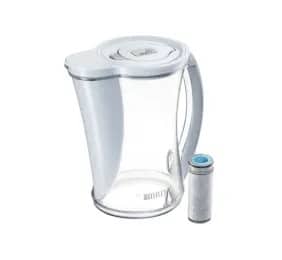
Cascade Stream Water Pitcher
Average price: $34.49
Capacity: 12-cup
Colors: White, Maroon
Features: Electronic filter indicator, Filter-As-You-Pour™ technology
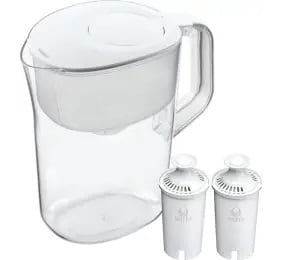
Champlain Water Pitcher
Average price: $36.99
Capacity: 10-cup
Colors: White
Features: Smart Light filter indicator
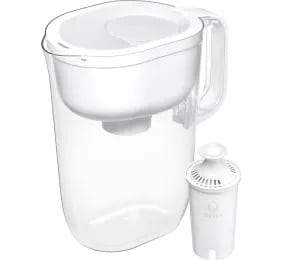
Huron Water Pitcher
Average price: $41.99
Capacity: 10-cup
Colors: White, Teal, Black, Red
Features: Smart Light filter indicator
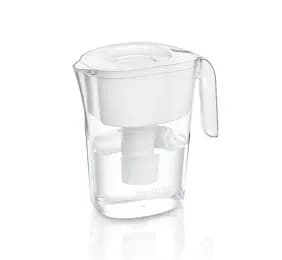
Lake Water Pitcher
Average price: $36.99
Capacity: 10-cup
Colors: White, Blue
Features: Electronic filter indicator, Autofill lid
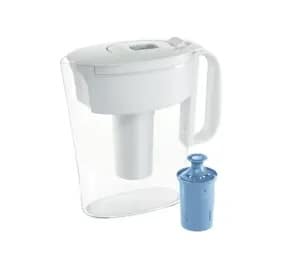
Metro Pitcher
Average price: $21.99 to $32.99
Capacity: 6-cup
Colors: White, Red, Turquoise
Features: Electronic filter indicator, Space-efficient design
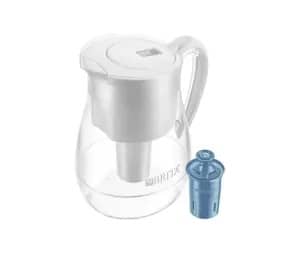
Monterey Water Pitcher
Average price: $41.99
Capacity: 10-cup
Colors: White, Blue, Black, Green
Features: Electronic filter indicator, Easy-fill lid
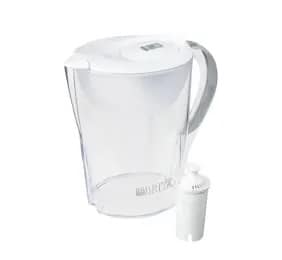
Pacifica Water Pitcher
Average price: $36.99
Capacity: 10-cup
Colors: White, Red, Black
Features: Electronic filter indicator, Easy-fill, locking lid
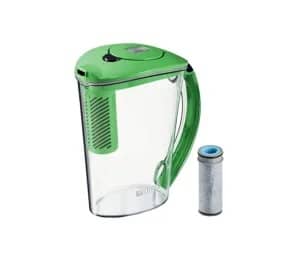
Rapids Stream Water Pitcher
Average price: $32.49
Capacity: 10-cup
Colors: Aquamarine, Grey
Features: Electronic filter indicator, Filter-As-You-Pour™ technology

SoHo Water Pitcher
Average price: $21.99
Capacity: 6-cup
Colors: White, Red, Black
Features: Electronic filter indicator, Space-efficient design
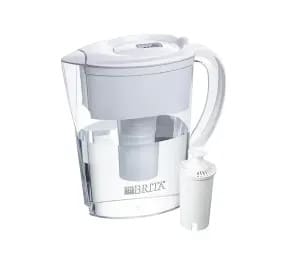
Space Saver Water Pitcher
Average price: $22.99
Capacity: 6-cup
Colors: White, Blue, Red, Black
Features: Electronic filter indicator
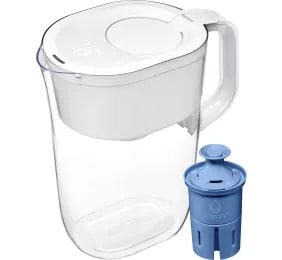
Tahoe Water Pitcher
Average price: $36.99 – $41.99
Capacity: 10-cup
Colors: White, Blue, Black, Green
Features: SmartLight filter indicator

Wave Water Pitcher
Average price: $36.99
Capacity: 10-cup
Colors: White
Features: Electronic filter indicator, Locking lid
Brita Faucet Filters
Brita has a line of faucet filters that you can install on your kitchen or bathroom faucet to provide clean drinking water.
There are two main models of Brita faucet filters with different features:
- Basic Water Filter Faucet System – This filter attaches onto any standard faucet. Itt comes with one 100-gallon filter which removes 99% lead from tap waters making them safe for drinking or cooking. It also reduces chlorine (taste/odor), benzene, asbestos, and trichloroethylene concentrations.
- Complete Water Filter Faucet System – This system attaches easily to your sink faucet and includes two 100 gallon filters. These filters remove 99% of lead as well as chlorine (taste/odor), benzene, asbestos, and trichloroethylene.
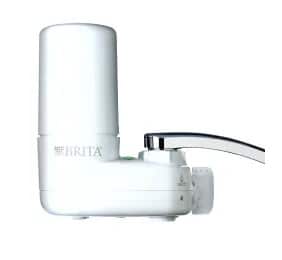
Basic Water Filter Faucet System
Average price: $19.99
Treatment capacity: 100 gallons
Contaminant removal: lead, chlorine (taste & odor)
Features: Filter replacement indicator
Colors: white, chrome
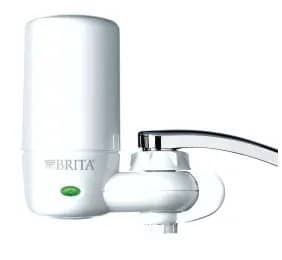
Complete Water Filter Faucet System
Average price: $19.99
Treatment capacity: 100 gallons
Contaminant removal: chlorine (taste & odor)
Features: Electronic filter indicator, 3 spray options
Colors: white
Brita Dispenser Filters
Brita has a line of dispenser filters that are designed to sit on your countertop and provide clean, filtered water for you and your family.
There are two main models of Brita dispenser filters:
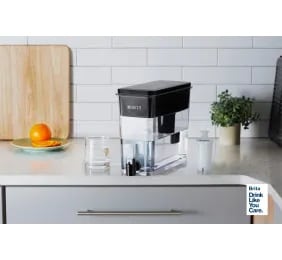
Ultramax Water Dispenser
Average price: $38.99 to $49.99
Treatment capacity: 27-cups
Features: Electronic filter replacement indicator
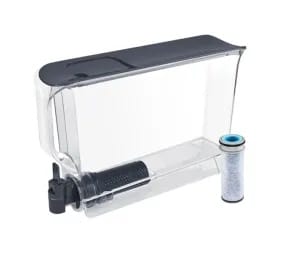
Ultraslim Stream Water Dispenser
Average price: $44.99
Treatment capacity: 25-cups
Features: Smart Light filter indicator (including auto-reset feature), Filter-As-You-Pour technology
Brita filter elements
Brita has replaceable filter elements for all of the water treatment products. The pitcher filters and Dispenser filters can use either the Elite or Standard filters.
Here is a description of the filter elements the Brita offers including pricing, capacity, service life, and other important information.

Elite filters
Average price: $19.99
Treatment capacity: 120 gallons
Service life: 6 months
Contaminant removal: removes 99% of lead; chlorine (taste & odor)
Pitcher compatibility: Fits all Brita pitchers and dispensers (except Stream)
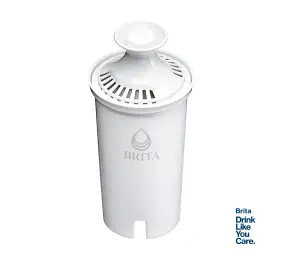
Standard filters
Average price: $7.99
Treatment capacity: 40 gallons
Service life: 2 months
Contaminant removal: chlorine (taste & odor)
Pitcher compatibility: Fits all Brita pitchers and dispensers
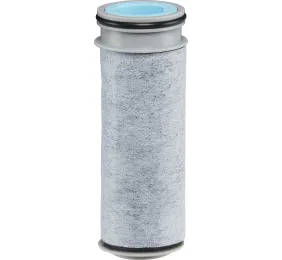
Stream filters
Average price: $7.99
Treatment capacity: 40 gallons
Service life: 2 months
Contaminant removal: chlorine (taste & odor)
Pitcher compatibility: Fits all Brita Stream pitchers and dispensers
Features: Filter-As-You-Pour technology
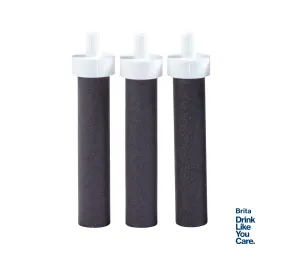
Water bottle filters
Average price: $14.99
Treatment capacity: 40 gallons
Service life: 2 months
Contaminant removal: chlorine (taste & odor)
Pitcher compatibility: Fits all Brita Premium Filtering Water Bottles
How do you replace a spent Brita filter and install a new one?
The Standard Brita pitcher filter should be replaced every two months or 40 gallons, whichever comes first. Elite filters are replaced after treating 100 gallons or every six months.
To replace your filter:
- Rinse your Brita Standard Filter with cold water for 15 seconds.
- Insert the filter into the reservoir by lining up the groove in the filter with the ridge in the reservoir. Press firmly for a tight seal.
- Add cold tap water. Discard your first three pitchers of filtered water or use it to water plants. It’s normal for carbon dust to appear in your first few fillings.
Brita Filter Maintenance
Brita filters have a consumable filter element that needs to be replaced every 100 gallons or about every four months. The frequency of replacement will depend on the specific filter you have and how much water you use.
It is important to follow the manufacturer’s instructions for replacing the filter. This will ensure your Brita filter continues to work properly.
How often do I need to replace my Brita filter
Each model of Brita filter has a recommended service life. Brita’s recommendations are summarized in the following table.
| Model | Volume of Water | Time |
| Longlast+ | 120 gallons | 6 months |
| Longlast | 100 gallons | 4 months |
| Standard Brita pitcher filter | 100 gallons | 4 months |
| Faucet filter | 100 gallons | 4 months |
Overview of Brita Filters
Brita filters are a type of pitcher filter that uses particle filtration and activated carbon adsorption to remove contaminants from drinking water. Activated carbon is a very effective treatment method for removing a wide variety of contaminant, including glyphosate, from water.
How they work
Brita filters include sediment filters and granular activated to purify drinking water. The activated carbon in the filters adsorbs a wide range of contaminants such as VOCs, solvents, herbicides, and pesticides from the water.
Water is poured into the pitcher reservoir where it flows via gravity through the filters. The contaminants are adsorbed to the activated carbon in the filters and the clean water is collected in the pitcher.
NSF certification
NSF International is an independent organization that tests and certifies products to ensure they meet safety and performance standards. Several Brita filters are certified by NSF to remove a wide range of contaminants from drinking water, including VOCs, solvents, herbicides, and pesticides.
NSF certification is a great way to confirm the claims made by equipment manufacturers. NSF conducts testing in accordance with strict protocols and issues certifications to products that meet their standards.
FAQs
Do any water filters remove glyphosate?
Several treatment technologies are known to be effective at removing glyphosate from water. Proven methods for treating glyphosate include reverse osmosis, distillation, activated carbon, and nanofiltration.
Does boiling water remove glyphosate from drinking water?
Boiling water does not remove glyphosate. In fact, boiling water will increase the concentration of Roundup because the water evaporates but the glyphosate remains behind.
What chemicals do Brita filters remove?
Brita filters remove a wide range of contaminants from water, including VOCs, solvents, herbicides, and pesticides.
Final Take on Brita Filters and Glyphosate
If you are concerned about glyphosate in your drinking water, Brita filters are not the best option for removal. While activated carbon is a very effective treatment method, the amount of glyphosate a Brita filter can remove is limited. There are other methods of treating glyphosate that may be more effective, such as reverse osmosis or distillation.


